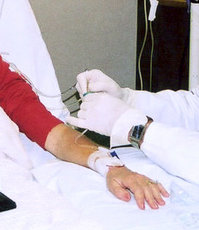The Roller Coaster Chronicles: Hotel Hell, Part 1

The welcome to my new lodging
Photo courtesy of Alex de Parry
A nurse welcomed me to my semi-private room by jabbing a needle into me, attaching a tube and connecting me to my own IV pole. It didn't take long afterwards to discover that semi-private is an oxymoron. There is nothing private about a hospital. Carts clang, bells ring, the PA system erupts at all hours, bodily functions are recorded for others to know, and sleep is permitted only between medications and tests, which are inflicted around the clock. Apparently hospitals haven't learned that sleep deprivation is a form of torture. No wonder I began to think of my new digs as Hotel Hell within hours after arrival.
In no time, complications everyone hopes to avoid went from bad to worse. The pain in my midsection was an infarct, or the death of part of my spleen, and all the mind-altering morphine dripped into me didn't make me loopy enough not to fear that my body had decided to kill me slowly, one part at a time. Nor, when pneumonia set in, did it hide the fact that the oxygen-delivering tubes in my nose meant I could no longer accomplish the small feat of breathing on my own. Worse, my disease was progressing and I got kicked out of the clinical trial because, according to my medical report, I failed chemo. Wait a minute. I didn't fail chemo. It failed me.
I felt like I was losing control of my own destiny and perhaps even my life. Several months later, Alex told me that I begged him not to keep me alive on life support. That I demanded he remind the hospital that it had a copy of my living will. That I even joked that he should get a full medical report on anyone he dated after I was gone. I don't remember the specifics of that conversation, but I do remember that Alex refused to discuss my possible demise.
My roommate, however, was only too happy to discuss it. She was a spunky 29-year-old with lupus and bladder cancer and tubes and pain and a family who didn't want to discuss her possible demise any more than my family did. Their denial might have wrapped them in a blanket of protection, but because we were unable to share our most intimate feelings with those we always had, it meant, for us, another chasm between us and our old lives.
And so at night, alone in our parallel beds, she and I discussed the indignities of cancer the way others might talk about the inconvenience of a dead battery. And we talked about the possibility of our own deaths. It was deeply depressing, but at the same time, comforting to share the weight with this stranger who understood. In retrospect, it was the first step toward facing my own mortality.
Five days into my stay at Hotel Hell, Dr. Kaminski reached into his arsenal of treatments and brought out a stronger chemotherapy. Alex stayed with me long after the infusion was over, but I was so groggy I hardly remember his presence.
Months later, he recalled sitting in the darkness of my room, his resolve to stay strong and positive shattered by the avalanche of complications I was experiencing. He feared the worst, tried to believe the best, and finally decided not to feel. Anything. He told himself that he simply needed to exist in order to face potential subsequent setbacks. While he wanted to believe that each tomorrow would bring improvement, he could find no solid evidence on which to build that hope. The first chemo had failed. There was no guarantee that the second would succeed. What if it didn't?
Oct. 29: Hotel Hell, Part 2
Betsy de Parry is the author of "The Roller Coaster Chronicles" and host of a series of webcasts about cancer. Find her on Facebook or Twitter or e-mail her.

